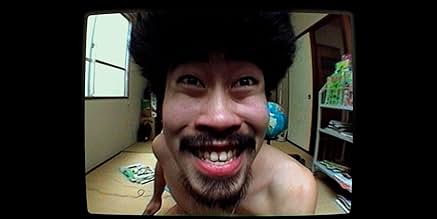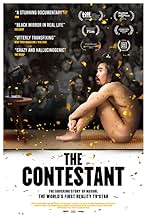AVALIAÇÃO DA IMDb
7,2/10
3,6 mil
SUA AVALIAÇÃO
Um participante de reality show japones ficou nu em uma sala por mais de um ano, com a tarefa de preencher sorteios de revistas para ganhar comida e roupas.Um participante de reality show japones ficou nu em uma sala por mais de um ano, com a tarefa de preencher sorteios de revistas para ganhar comida e roupas.Um participante de reality show japones ficou nu em uma sala por mais de um ano, com a tarefa de preencher sorteios de revistas para ganhar comida e roupas.
- Prêmios
- 6 indicações no total
Tomoaki Hamatsu
- Self
- (as Nasubi)
Avaliações em destaque
I noticed this documentary, half intrigued but horrified by the premise, I'm about 3/4 into the documentary and feel like punching the producer of Denpa Shonen Toshio Tsuchiya who is still pleased with what he did, and doesn't seem to know empathy.
With what I know from the afterlife, he will (like everyone) get to feel all the pain inflicted on other living beings, and feel exactly what they went through.
This all just makes me feel sad. Some of the things that happened in there will be amongst the worst nightmare people can imagine.
The documentary itself deserves an 8, I would probably not rate the original show that high.
With what I know from the afterlife, he will (like everyone) get to feel all the pain inflicted on other living beings, and feel exactly what they went through.
This all just makes me feel sad. Some of the things that happened in there will be amongst the worst nightmare people can imagine.
The documentary itself deserves an 8, I would probably not rate the original show that high.
The creator of this show is a huge pile of S@&T, He thinks he was being clever and interesting and creating entertaining shows even though he was essentially being a bully torturing another man for profit. I still got the feeling that he thinks he's hot S@&T, and kind of wish that he would've gone to jail. The other creators that are filmed also are responsible for taking part. They have zero sympathy for their fellow man. They are essentially the bully on the schoolyard making money. I hope the contestant himself Has a very fulfilling life now. What a sad story, take advantage of a guy who is Trying to make it.
This story is referred to as a real-life version of "The Truman Show." Japanese entertainer Nasubi (meaning eggplant) was selected, due to his "luck," to participate in a prank show. He was confined in a room, required to strip off all his clothes, and forced to live solely by entering magazine sweepstakes through postcards. During this period, he was not allowed to communicate with anyone and had no other food sources apart from minimal life-sustaining supplies. This comedy-oriented reality show documented his life in the small room for a total of one year and three months. The show featured a segment each week updating viewers on Nasubi's latest status. In the end, the show revealed the entire reality show to a bewildered Nasubi, standing naked in the studio hall.
This reality show emerged during the golden age of television's influence in 1998, appearing simultaneously in cultural history with "The Truman Show." Both reflect an era obsessed with entertainment, showcasing the media's probing at the boundaries of human decency. The show "Denpa Shonen," which birthed this reality segment, can be considered the ancestor of various prank shows in Japan today. To understand how the show operated, one must first understand the entertainers in the Japanese entertainment industry.
In the Japanese entertainment industry, entertainers are viewed as the lowest tier. Unlike actors or singers who have specialized skills, these entertainers exist to enrich the entertainment value of shows. They play clown-like roles, needing to rely on antics, humor, and even sacrificing their dignity to gain screen time and recognition.
Because of this, entertainers become targets for prank shows. After private agreements between agencies and TV stations, entertainers can be caught off guard and become the targets of these pranks. The camera captures their reactions to the pranks, ensuring the footage is suitable for broadcast. Regardless of the pain, confusion, or anger, entertainers must maintain a sense of being pranked in front of the camera, balancing their emotions to preserve the show's effect. The captured footage is then edited by the TV station, adding subtitles and guest reactions in the studio, diluting the emotions of the pranked individuals and transforming it into humorous segments for viewers.
The "A Life in Prizes" segment of "Denpa Shonen," aired from 1998 to 1999, can be considered the pioneer of this model. As a reality show, its execution and program effect were astonishing.
Firstly, the producers concealed the true nature of the show from Nasubi, promising it would not air on TV to alleviate his doubts. Secondly, they forced him to live without clothes, degrading his dignity to enhance the entertainment effect, such as pixelating his private parts with eggplant shapes. Thirdly, the cruel rule of living off sweepstakes was chosen to increase the show's uncertainty and entertainment value. With no cooking utensils, Nasubi made porridge with drink cartons and, when he ran out of rice, resorted to dog food as his main carbohydrate source. The show even featured scenes of him walking a stuffed toy around the room. Fourthly, they set a prize goal of 1 million yen, extending the show for 11 months, further accumulating the segment's popularity. Fifthly, they condensed 24/7 real-life footage into weekly six-minute episodes, only retaining the entertaining parts while deliberately ignoring the cruelty of his life. Sixthly, they effectively used other media to enhance the show's impact, such as live streaming online and selling Nasubi's diary as a bestseller. Seventhly, they created plot twists; after Nasubi reached the 1 million yen goal, they sent him directly to South Korea for another experiment.
In the final scene of the reality show, Nasubi appeared in a small tatami room in the center of the studio. The producer asked him to strip naked again and sit in the middle of the room. Suddenly, the walls collapsed, and he found himself sitting on stage, covering his private parts with a cushion, shocked, as the audience below clapped and cheered. The audience applauded the show's entertainment and humor, completely ignoring the feelings of the protagonist at the center. As viewers, they experienced only the entertainment, overlooking the fact that the individual in the event was a living person capable of feeling pain, just like themselves. Abandoning the recognition and respect for individual dignity, society falls into selective blindness, capable of inflicting the most painful and cruel things on others. Nasubi's shock was a loss of trust in humanity, a shock from peering into the darkest corners of human nature. This scene can be called the most real and darkest moment in television history.
However, the story does not end there. From 1999, Nasubi became one of Japan's most famous entertainers. He enjoyed a successful entertainment career, continuing to perform as the Nasubi from "A Life in Prizes." Yet, he gradually discovered an unfillable void within himself, increasingly loathing his actions. Until the Great East Japan Earthquake, which caused massive destruction in his hometown, Fukushima Prefecture, he devoted himself to post-disaster relief and the reconstruction of his hometown. From then on, he found his direction and has been dedicated to charitable work in Fukushima Prefecture.
Though he gazed into the abyss of human nature, Nasubi did not give up on human society. The experience of "A Life in Prizes" made him realize that one cannot live in isolation, unable to maintain normal physical and mental states. Only by transcending personal interests and establishing sincere emotional connections with others can the dark corners of human nature be illuminated, leading to the common good that benefits society as a whole. Nasubi summarized it this way: "A person can exert more strength when helping others than when working solely for themselves."
This reality show emerged during the golden age of television's influence in 1998, appearing simultaneously in cultural history with "The Truman Show." Both reflect an era obsessed with entertainment, showcasing the media's probing at the boundaries of human decency. The show "Denpa Shonen," which birthed this reality segment, can be considered the ancestor of various prank shows in Japan today. To understand how the show operated, one must first understand the entertainers in the Japanese entertainment industry.
In the Japanese entertainment industry, entertainers are viewed as the lowest tier. Unlike actors or singers who have specialized skills, these entertainers exist to enrich the entertainment value of shows. They play clown-like roles, needing to rely on antics, humor, and even sacrificing their dignity to gain screen time and recognition.
Because of this, entertainers become targets for prank shows. After private agreements between agencies and TV stations, entertainers can be caught off guard and become the targets of these pranks. The camera captures their reactions to the pranks, ensuring the footage is suitable for broadcast. Regardless of the pain, confusion, or anger, entertainers must maintain a sense of being pranked in front of the camera, balancing their emotions to preserve the show's effect. The captured footage is then edited by the TV station, adding subtitles and guest reactions in the studio, diluting the emotions of the pranked individuals and transforming it into humorous segments for viewers.
The "A Life in Prizes" segment of "Denpa Shonen," aired from 1998 to 1999, can be considered the pioneer of this model. As a reality show, its execution and program effect were astonishing.
Firstly, the producers concealed the true nature of the show from Nasubi, promising it would not air on TV to alleviate his doubts. Secondly, they forced him to live without clothes, degrading his dignity to enhance the entertainment effect, such as pixelating his private parts with eggplant shapes. Thirdly, the cruel rule of living off sweepstakes was chosen to increase the show's uncertainty and entertainment value. With no cooking utensils, Nasubi made porridge with drink cartons and, when he ran out of rice, resorted to dog food as his main carbohydrate source. The show even featured scenes of him walking a stuffed toy around the room. Fourthly, they set a prize goal of 1 million yen, extending the show for 11 months, further accumulating the segment's popularity. Fifthly, they condensed 24/7 real-life footage into weekly six-minute episodes, only retaining the entertaining parts while deliberately ignoring the cruelty of his life. Sixthly, they effectively used other media to enhance the show's impact, such as live streaming online and selling Nasubi's diary as a bestseller. Seventhly, they created plot twists; after Nasubi reached the 1 million yen goal, they sent him directly to South Korea for another experiment.
In the final scene of the reality show, Nasubi appeared in a small tatami room in the center of the studio. The producer asked him to strip naked again and sit in the middle of the room. Suddenly, the walls collapsed, and he found himself sitting on stage, covering his private parts with a cushion, shocked, as the audience below clapped and cheered. The audience applauded the show's entertainment and humor, completely ignoring the feelings of the protagonist at the center. As viewers, they experienced only the entertainment, overlooking the fact that the individual in the event was a living person capable of feeling pain, just like themselves. Abandoning the recognition and respect for individual dignity, society falls into selective blindness, capable of inflicting the most painful and cruel things on others. Nasubi's shock was a loss of trust in humanity, a shock from peering into the darkest corners of human nature. This scene can be called the most real and darkest moment in television history.
However, the story does not end there. From 1999, Nasubi became one of Japan's most famous entertainers. He enjoyed a successful entertainment career, continuing to perform as the Nasubi from "A Life in Prizes." Yet, he gradually discovered an unfillable void within himself, increasingly loathing his actions. Until the Great East Japan Earthquake, which caused massive destruction in his hometown, Fukushima Prefecture, he devoted himself to post-disaster relief and the reconstruction of his hometown. From then on, he found his direction and has been dedicated to charitable work in Fukushima Prefecture.
Though he gazed into the abyss of human nature, Nasubi did not give up on human society. The experience of "A Life in Prizes" made him realize that one cannot live in isolation, unable to maintain normal physical and mental states. Only by transcending personal interests and establishing sincere emotional connections with others can the dark corners of human nature be illuminated, leading to the common good that benefits society as a whole. Nasubi summarized it this way: "A person can exert more strength when helping others than when working solely for themselves."
All I could think while watching this is that in America this kind of TV star never actually gets rich. They might get their foot in the door, or get a lump sum of money they might be able to apply to other endeavors, but you don't necessarily become a millionaire set for life just from being on a TV show - even if people loved that show. That kind of thing really mostly applies to big Hollywood actors. And what this man endured was absolutely traumatic abuse.
The absolute gall of that producer calling himself the devil, and saying he didn't know "at the time" how far was too far. Really? You were an adult with a career not a twelve year old kid, what do you mean you didn't know at the time how far was too far.
Really intriguing to watch, and I am glad Nasubi was able to use his fame to move forward and help people in Fukushima. It may have even given him the tenacity required to survive Mt. Everest if you really think about it...but still.
The absolute gall of that producer calling himself the devil, and saying he didn't know "at the time" how far was too far. Really? You were an adult with a career not a twelve year old kid, what do you mean you didn't know at the time how far was too far.
Really intriguing to watch, and I am glad Nasubi was able to use his fame to move forward and help people in Fukushima. It may have even given him the tenacity required to survive Mt. Everest if you really think about it...but still.
I watched this by myself and I was saying out loud "WOW", "I don't believe this", and many expletives.
It's a crazy ride. I'm not really an outwardly emotion person, but at certain points, I teared up - out of happiness, out of shock, out of just wrapping my head around.
It is much more than a voyeuristic experience of him endure, it really is a reflection of humanity; on one hand the cruelty that humans can afflict on another, and then it also showcases the compassion of humanity.
After watching, I am so surprised that here in the US I had never heard about this. It's really unbelievable.
I am typing this right after watching and my head is still wrapping my head around what I just saw.
It's a crazy ride. I'm not really an outwardly emotion person, but at certain points, I teared up - out of happiness, out of shock, out of just wrapping my head around.
It is much more than a voyeuristic experience of him endure, it really is a reflection of humanity; on one hand the cruelty that humans can afflict on another, and then it also showcases the compassion of humanity.
After watching, I am so surprised that here in the US I had never heard about this. It's really unbelievable.
I am typing this right after watching and my head is still wrapping my head around what I just saw.
Você sabia?
- ConexõesFeatures Susume! Denpa shônen (1992)
Principais escolhas
Faça login para avaliar e ver a lista de recomendações personalizadas
- How long is The Contestant?Fornecido pela Alexa
Detalhes
Bilheteria
- Faturamento bruto mundial
- US$ 24.108
- Tempo de duração
- 1 h 30 min(90 min)
- Cor
- Mixagem de som
Contribua para esta página
Sugerir uma alteração ou adicionar conteúdo ausente















